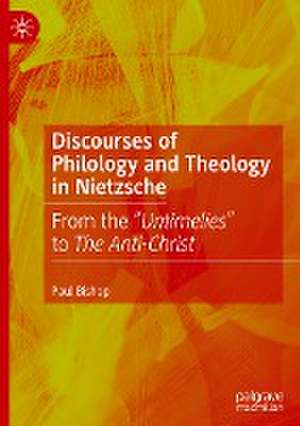Discourses of Philology and Theology in Nietzsche: From the “Untimelies” to The Anti-Christ
Autor Paul Bishopen Limba Engleză Hardback – noi 2023
Preț: 792.96 lei
Preț vechi: 967.03 lei
-18% Nou
Puncte Express: 1189
Preț estimativ în valută:
151.73€ • 158.85$ • 125.55£
151.73€ • 158.85$ • 125.55£
Carte tipărită la comandă
Livrare economică 07-21 aprilie
Preluare comenzi: 021 569.72.76
Specificații
ISBN-13: 9783031422713
ISBN-10: 3031422716
Ilustrații: XVII, 493 p. 5 illus.
Dimensiuni: 148 x 210 mm
Greutate: 0.76 kg
Ediția:1st ed. 2023
Editura: Springer International Publishing
Colecția Palgrave Macmillan
Locul publicării:Cham, Switzerland
ISBN-10: 3031422716
Ilustrații: XVII, 493 p. 5 illus.
Dimensiuni: 148 x 210 mm
Greutate: 0.76 kg
Ediția:1st ed. 2023
Editura: Springer International Publishing
Colecția Palgrave Macmillan
Locul publicării:Cham, Switzerland
Cuprins
1. Introduction.- 2. Nietzsche and the History of Atheism.- 3. Nietzsche and the Quest for the Historical Jesus.- 4. Nietzsche, David Friedrich Strauß, and the post-Straussian Tradition.- 5. Nietzsche’s Methods and Portrait of Christ.- 6. Nietzsche and St Paul.- 7. Nietzsche on Philology.- 8. Conclusion.
Notă biografică
Paul Bishop is William Jacks Chair of Modern Languages at the University of Glasgow.
Textul de pe ultima copertă
This study proposes to examine the tension in Nietzsche’s works between two competing discourses, i.e., the discourse of theology and the discourse of philology. It argues that, in order to understand Nietzsche’s complicated standpoint and the aim of his Kulturkritik, we have to appreciate how he operates with two different discourses, one indexed to belief, faith, liturgy (i.e., the discourse of theology) and another indexed to analytical reason, sceptical investigation, and logical argumentation, as well as historical context and linguistic precision (i.e., the discourse of philology). Its core thesis is that, in the end, Nietzsche can no longer believe, because he thinks he has uncovered a fraudulent production of meaning in the texts, in a way that is comparable with his insight into the production of morality in On the Genealogy of Morals (1887).
Paul Bishop is William Jacks Chair of Modern Languages at the University of Glasgow.
Caracteristici
Examines the tension in Nietzsche’s works between two competing discourses, theology and philology Argues Nietzsche cannot believe because he thinks he uncovers a fraudulent production of meaning in biblical texts Understanding his ‘philological turn’ explains the increasing urgency of his anti-Christian polemics
